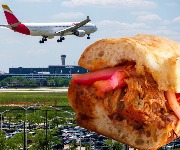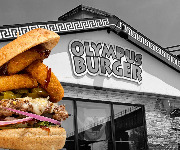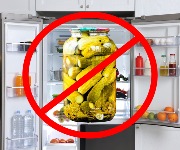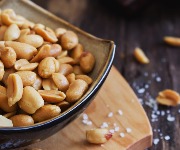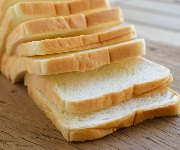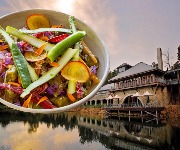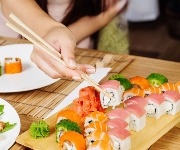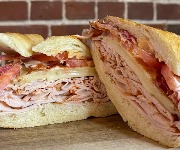An interview with Gennaro Contaldo
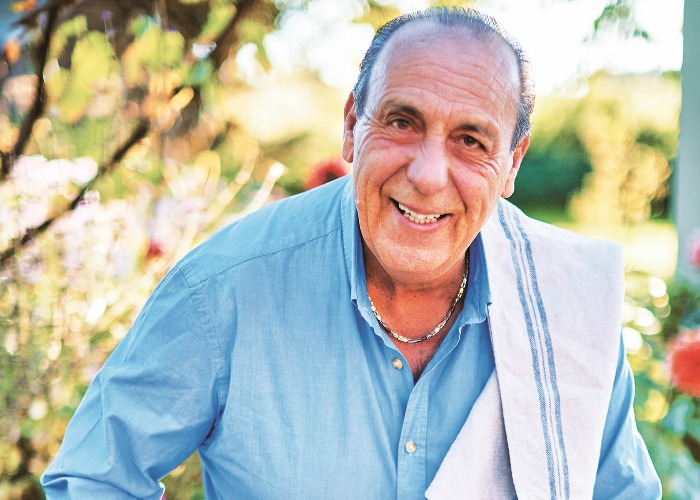
Italian chef Gennaro Contaldo is a regular on TV but we caught up with him about his life behind the scenes – his childhood on the Amalfi Coast, how to make proper carbonara with Parmigiano Reggiano and what he loves about working with Jamie Oliver.
Over the past 20 years Gennaro Contaldo has become a familiar face, penning cookbooks and appearing on our TV screens in food programmes like the BBC’s Two Greedy Italians with the late, great Antonio Carluccio. He's also well-known for training Jamie Oliver and later travelling throughout Italy alongside his protégé in Jamie Cooks Italy.
We caught up with him over the phone to find out more about his life in food. And it's clear there was no other profession Gennaro wanted to do. In Minori, the village in which he grew up, everyone cooked, including the men, and he started training from a young age at his father’s friend’s restaurant. After all this time, the chef's passion has endured. “I’m cooking every single day, even now. I love it,” he tells me.
But Gennaro arrived in London at a time when Italian food in the UK wasn't so good. In the late 1960s, he saw chefs putting cheese sauce in carbonara and describe dishes “from the Amalfi Coast” that were definitely not.
But thanks to Gennaro and other chefs championing the use of great ingredients, that's changed. Although when I call him to talk, he’s keen to laugh about his experiences, but also make sure I know how to prepare carbonara correctly.
READ MORE: An interview with MasterChef finalist Santosh Shah
What was it like growing up on the Amalfi coast?
I'm from a small village where everybody cooks what’s in season. When it’s zucchini season, everybody serves zucchini. When it's time to make meat sausages at Christmas, everybody uses that ingredient. You've got four seasons and every season brings something. It’s good because it’s natural.
There were a lot of fish because I come from the seaside. The fish man came down in the morning and we used to go and buy them, and I also used to go fishing myself. There were so many farms and allotments, and the lemons that grew were unbelievable.
Everybody was friendly and learnt how to cook from each other. All my family cooks including my granddad. The men play a big part in cooking as well. You know, my mother let my father cook. Every time he turned around, she used to adjust his cooking. It was marvellous, it was really, really good.
How did you get into cooking?
My father had a linen shop in the heel of Amalfi Coast and he had lots of clients in the surrounding and nearby villages. Sometimes I used to go with him, but one particular time he had to go to the next village so he asked his friend Alfonso who owned a restaurant “Can you look after Gennarino and I’ll pick him up this afternoon?”.
My name is Gennaro, but it’s Gennarino for a small boy. I loved what chef Alfonso did and helping him in the kitchen. It came to the afternoon and my father picked me up. Three years later, my father was still picking me up from there.
That was when I was about 10 years-old. By the time I was 13 I thought I was the best chef in the world.
Is there any other profession you would have done?
No, I always loved the kitchen, I always wanted to cook.
But as a young boy in London, I found it strange. The Italian cooking they used to do was not Italian. I remember in a restaurant, the chefs cooked something that was from where I come from. I looked at it and I said "This is not the way we cook."
Do you think Italian cooking has changed in Britain?
It has changed unbelievably. I couldn’t even find a bottle of mineral water, olive oil or tin of tomatoes. If somebody came back from Italy, they’d bring a suitcase full of salami, tomatoes, preserves and lots of cheese.
Most restaurant owners improvised. If somebody was called Gennaro, they’d cook a chicken and call it Gennaro's chicken, but that is not the proper way.
READ MORE: An interview with MasterChef winner Irini Tzortzoglou
The French maintained a very high standard and the Italians stayed behind. Then out of the blue we said hold on a minute, let me show you how to cook the food properly.
When I started work with Antonio Carluccio many years ago, we used to be criticised. People used to say “What are they doing?” because we always presented Italian food the proper way. It’s simple, what you see is what you need. Italy is about taste, freshness and nothing else.
What do you love about working with Jamie Oliver?
It's like father and son. We understand each other. Jamie uses the best of everything and this is my policy too, because you will taste it. It’s so easy. It’s just a joy.
What are your favourite Italian ingredients?
Parmigiano Reggiano is one ingredient which I cannot live without. Make a big salad and use Parmigiano Reggiano to give it some flavour.
You don’t need to throw any part of it out, you can eat everything including the rind. You can use it to flavour soups and stews, and use the cheese with vegetables, meat and fish.
You can have it on a cheeseboard. Parmigiano Reggiano, wine and rustic bread. It’s not just for grating, it can be used in many, many different ways.
READ MORE: Our guide to Parmesan and what to cook with it
What Italian dish should everyone know how to make?
When I first came to London I went to work in a restaurant and the chef showed how they made carbonara. They took some spaghetti – it was already boiled, it just had to be warmed up – and made a cheese sauce. I told him this is not the way to do it. He looked at me and said "After the service, get your jacket. Please don't come here anymore."
It's easy to make a carbonara. You have guanciale which is pig cheek or pancetta, and cut it into small pieces. You boil the pasta and add it to the pancetta or guanciale. Then you have a couple of egg yolks with some lovely Parmigiano Reggiano or Pecorino – Parmigiano Reggiano is the one I like – and stir it around. Perhaps you will add a little pasta water and obviously lots of black pepper. Then another grating of cheese.
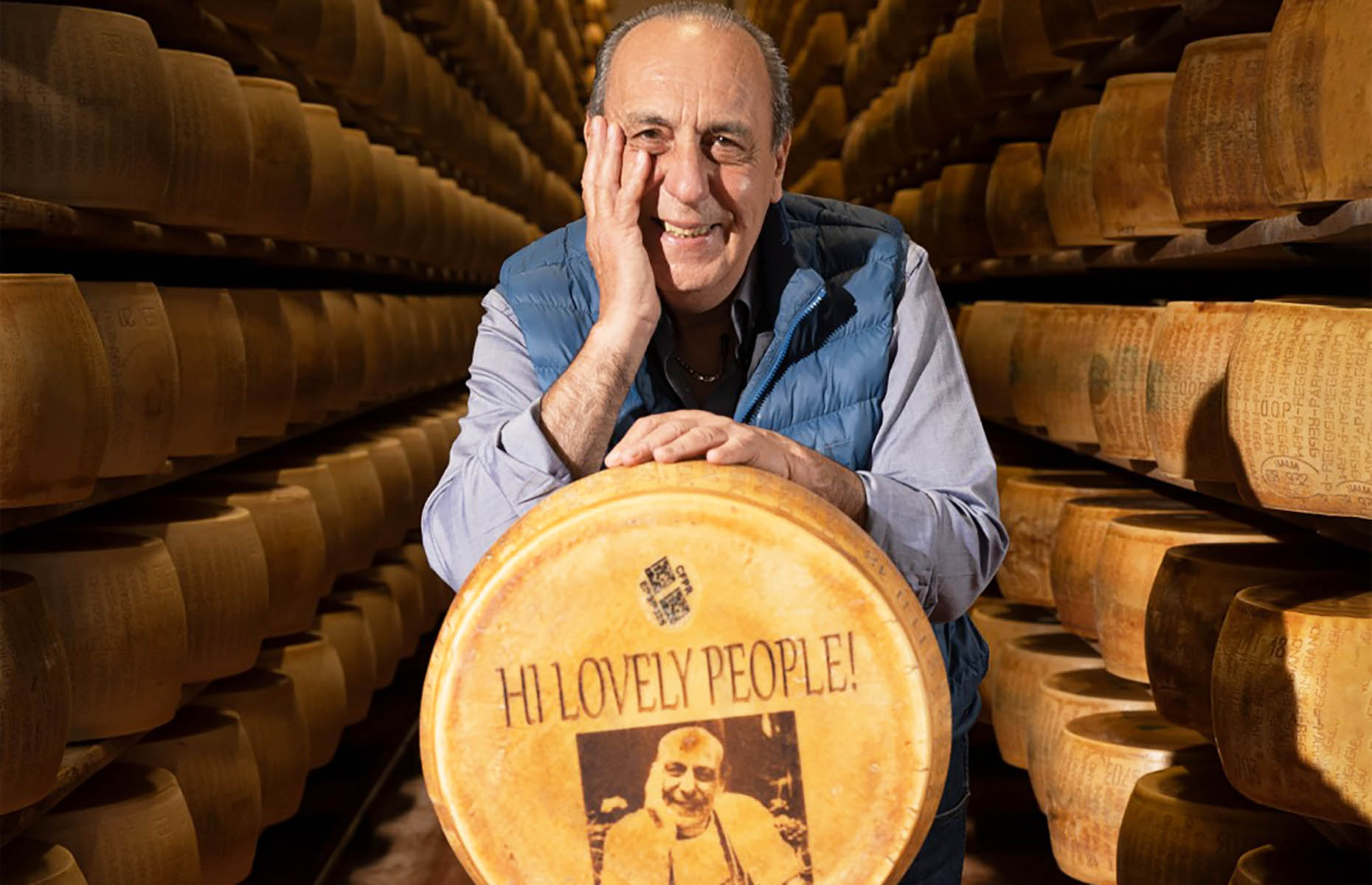 Image courtesy of Parmigiano Reggiano
Image courtesy of Parmigiano Reggiano
What do you have planned next?
I have another book coming very, very soon called Lemon. We went to my home town in Italy to get these beautiful recipes from the whole village.
Lemons are not just for putting in gin and tonic. Lemons are used in cooking all around the world. We've worked on this book for three years and it will be out at the end of summer.
READ MORE: Fennel, leek and Parmesan bake recipe
This interview was arranged courtesy of Parmigiano Reggiano. You can watch a documentary with Gennaro Contaldo about how the cheese is made here.
Lead image by David Loftus.
Most Recent
Comments
Be the first to comment
Do you want to comment on this article? You need to be signed in for this feature
